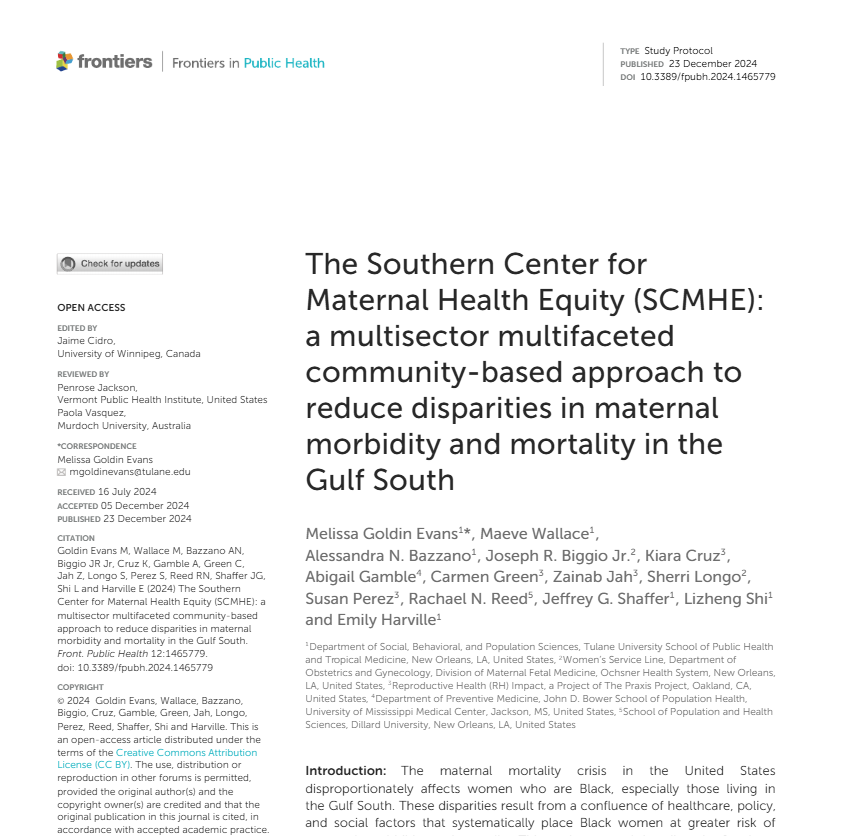
Southern Center for Maternal Health
Tulane University, Praxis Project, and Ochsner Health
The Southern Center for Maternal Health aims to implement multilevel programs to prevent maternal complications and improve access to care for Black birthing women, pregnancies in the Gulf South, and those living in maternity care deserts.

Tulane University
Contact
-
Co-Principal Investigator: Dr. Emily Harville
-
Co-Principal Investigator: Dr. Joseph Biggio
-
Co-Principal Investigator: Dr. Susan Perez

At a Glance
3
Research Projects
10+
Community Partners
Research Topics- Implicit Bias
- Postpartum Medicaid extension
- Remote monitoring
Status
Formative research
Overarching Aims
To improve maternal health through testing community-prioritized and co-developed strategies to address root causes of maternal morbidity and mortality focusing on Black women in the Gulf South
To test a multifaceted behavior change intervention to reduce biased treatment in a large health care system
Research Project Details
Conduct a trial in a large health care system of a multifaceted behavior change intervention to reduce biased treatment.
This study is a multi-hospital cluster-randomized controlled trial that aims to compare the effect of an interactive multifaceted intervention (i.e., implicit bias training, incorporating equity in all quality improvement, and community partnership building) to a remote asynchronous training on implicit bias within 9 Ochsner hospitals.
Adapt and evaluate an enhanced remote monitoring package, Connected MOM+ (at-home blood pressure and weight monitoring)
This study will use a stepped-wedge design to examine implementation of enhanced remote monitoring of blood pressure and weight among pregnant patients across 27 parishes in northern Louisiana.
Impact of Medicaid Postpartum Coverage Extension and Mandated Postpartum Depression Screening on Care for Gestational Diabetes and Pregnancy-Induced Hypertension
The Medicaid postpartum extension (MPE) and postpartum depression screening mandate in Louisiana will be compared to Mississippi to evaluate the effectiveness and contextual factors of implementation strategies that aim to improve maternal postpartum health and health equity.
Key Maternal Health Indicators: Louisiana
-
54,927
live births in 20231
-
36.1%
of births were cesarean deliveries 1
-
13.4%
of births were preterm1
-
63.3%
of deliveries were covered by Medicaid 1
-
793
women with life threatening complications per every 100,000 births 2
-
26.2
women die from pregnancy complications per every 100,000 births 3
-
2.5x
more Black women die from pregnancy complications than White women 3
-
Top-3 Causes
of pregnancy-related deaths: cardiovascular conditions, infection, and accidental overdose3
-
12.1%
of women are without a birthing hospital within 30 minutes 4
-
73.1%
of birthing women start prenatal care in the 1st trimester1
Partner Organizations
The Southern Center for Maternal Health is a partnership led by the Praxis project, Tulane University, and Ochsner Health System. Other academic partners include Dillard University and The University of Mississipi Medical Center.
The Center's Community Action and Advisory Boards include representatives from:
- Arkansas Birthing Project
- Birthmark Doula Collective
- Blooming Moon Midwifery
- Care Pregnancy Center
- Golden Aura Wellness
- Happy Healthy Pregnancy, LLC
- Housing Authority of Monroe
- Institute for Women's and Ethnic Studies
- Jenkins Counseling Services, LLC
- Maternal Beats, LLC
- New Orleans Maternal and Child Health Coalition
- Ochsner LSU Health Monroe Medical Center
- Vibrant Minds Therapy & Consulting
- Women's Foundation of the South
- Xavier University of Louisiana
"Our aim is to significantly impact maternal health in the Gulf South using participatory, community-centered, and radically equity-focused approaches."

Our Work
References
- Data are from 2023 live births occurring within the state. Cesarean deliveries are the percentage of live births where the final route and method of delivery was cesarean. Preterm births are the percentage of live births where the gestational age at birth was less than 37 weeks. Medicaid coverage is the percentage of live births where the source of payment for the delivery hospitalization was Medicaid. Prenatal care in the 1st trimester is the percentage of live births where the first prenatal appointment occurred between the 1st and 3rd month of pregnancy.
Source: Centers for Disease Control and Prevention, National Center for Health Statistics. National Vital Statistics System, Natality on CDC WONDER Online Database. - Life threatening complications are deliveries with a diagnosis or procedure code indicating severe maternal morbidity. Information reported for 2020.
Source: Agency for Healthcare Research and Quality, Healthcare Cost and Utilization Project, State Inpatient Databases 2010 to 2021. - Number of deaths is based on pregnancy-related deaths in 2020. The difference in rate of pregnancy-related deaths between Black and White women and top 3 causes of pregnancy-related deaths are based on deaths in 2020. Pregnancy-related deaths include deaths during or within a year of pregnancy from causes related to or aggravated by the pregnancy or its management.
Source: Louisiana Department of Health. Louisiana Pregnancy-Associated Mortality Review, 2020 Report. - March of Dimes Maternity Care Deserts Report 2023.







